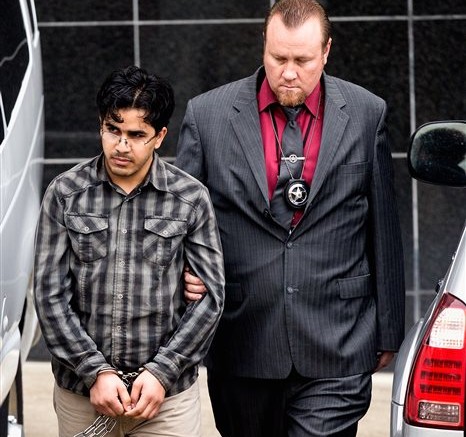HOUSTON (AP) — An Iraqi refugee who is facing charges he tried to help the Islamic State group was denied bond on Wednesday after a federal agent testified the Iraqi man had wanted to set off bombs at two Houston malls.
Omar Faraj Saeed Al Hardan who came to Houston from Iraq in 2009, was indicted last week on three charges, including attempting to provide support to a designated terrorist organization. He pleaded not guilty to all three charges on Wednesday.
U.S. District Judge Lynn Hughes ruled there would be a serious risk that Al Hardan would flee if granted bond.
Hughes made his decision after listening to testimony from Homeland Security Special Agent Herman Wittliff, who said that in addition to Al Hardan wanting to set off bombs at the two Houston malls, including the popular Galleria mall, the Iraqi man was also learning how to make electronic transmitters that could be used to detonate improvised explosive devices.
“He wanted to build them (the transmitters) for ISIL,” Wittliff said.
“For what purpose?” asked prosecutor Ralph Imperato.
“So he could kill people,” Wittliff replied.
Al Hardan’s arrest brought criticism of the Obama administration’s refugee policies from Texas Gov. Greg Abbott, who has been a leader among Republican governors calling for a halt to resettlement of Syrian refugees in their states. Republican presidential candidate Sen. Ted Cruz of Texas called for a retroactive review of all refugees who have come to the U.S.
Immigrant advocates say they have full confidence in the vetting process and that tens of thousands of Iraqi refugees have been successfully resettled in the U.S.
Prosecutors allege Al Hardan was coordinating efforts with another Iraqi refugee living in California, Aws Mohammed Younis Al-Jayab, to get weapons training and eventually sneak into Syria to fight alongside the terrorist group.
Wittliff was the only prosecution witness at Wednesday’s hearing. Defense attorney David Adler didn’t present any witnesses but while questioning Wittliff, suggested there was nothing illegal about Al Hardan having the electronic components that FBI agents found in his apartment.
Al Hardan’s older brother, Saeed Faraj Saeed Al Hardan, has said his sibling has denied any wrongdoing and that neither his sibling nor anybody in their family had ever expressed any support for the Islamic State.
Authorities say Al Hardan and Al-Jayab used social media to discuss their support of the terrorist group. Al-Jayab and Al Hardan communicated in April 2013, and Al Hardan expressed interest in fighting in Syria, authorities said. Prosecutors allege Al Hardan tried to provide resources to the Islamic State beginning around May 2014.
If convicted, Al Hardan faces up to 25 years in prison.
Al Hardan, who is a legal permanent resident, is married, has an 8-month-old son and had worked as a limousine driver before his arrest, according to his brother.
Al-Jayab remains jailed in Sacramento, California. Authorities say Al-Jayab fought twice in Syria, including with a group later affiliated with the Islamic State between November 2013 and January 2014.
___
Follow Juan A. Lozano on Twitter at www.twitter.com/juanlozano70
Copyright 2016 The Associated Press. All rights reserved. This material may not be published, broadcast, rewritten or redistributed.









.jpg)